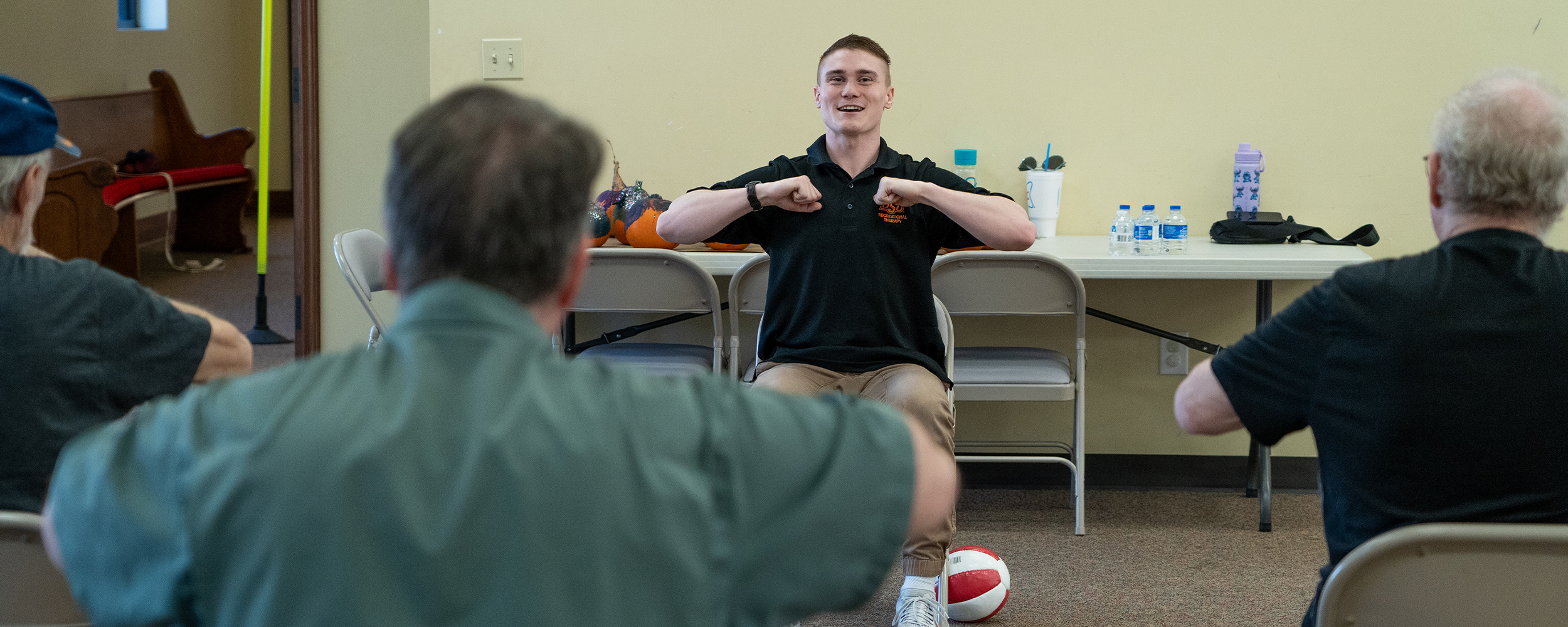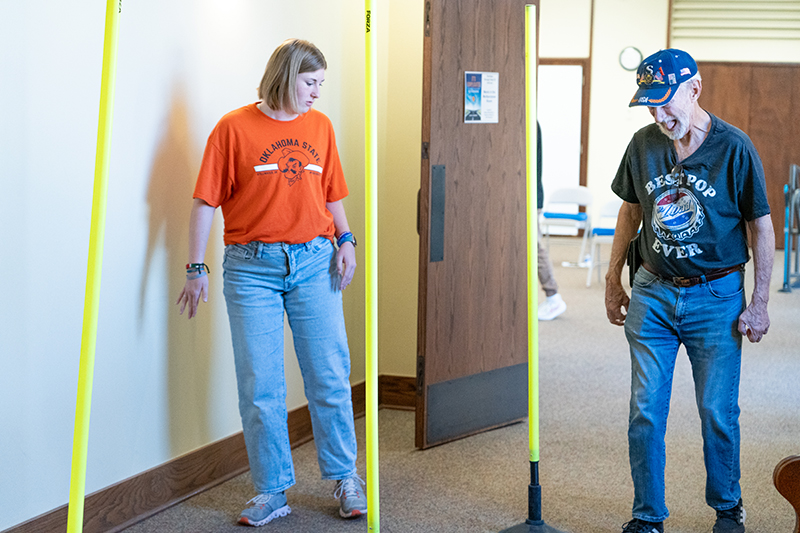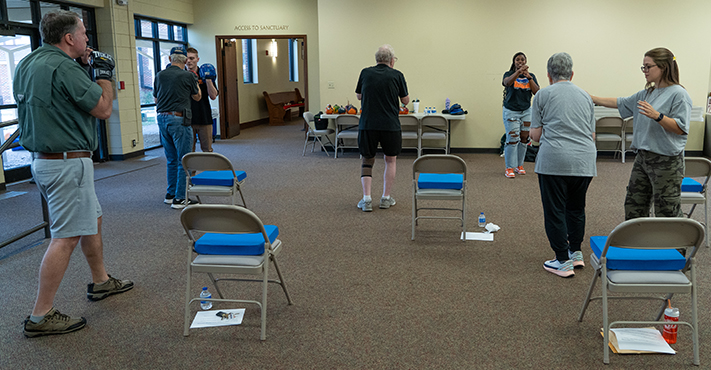
Passmore pushes for Parkinson’s research, starts community for those affected
Friday, November 7, 2025
Media Contact: Kirsi McDowell | Communications Coordinator | 405-744-8320 | kirsi@okstate.edu
Creating a sense of community for individuals with chronic conditions can be crucial for enhancing overall well-being.
Since 2018, Oklahoma State University professors Dr. Tim Passmore and Dr. Sabiha Parveen have been researching Parkinson’s disease and working through group-based therapies to find solutions for those who experience the symptoms.
Passmore — professor and interim head of the School of Kinesiology, Applied Health and Recreation in the College of Education and Human Sciences — has been working in collaboration with Parveen, an associate professor in the College of Arts and Sciences’ Department of Communication Sciences and Disorders, to improve the well-being of Parkinson’s patients in the Stillwater area.
Passmore and Parveen aim to better understand how Parkinson’s disease (PD) affects individuals and identify solutions to enhance their lives.
PD is a brain disorder that affects movement. Those living with the disease can experience shaking, stiffness and difficulty with balance and coordination. As the disease progresses, people may have difficulty walking and talking.
This project began with a presentation on campus to a group of individuals who either had been diagnosed with PD or were caring for affected family members.
“We addressed potential intervention exercises in areas of balance, fall recovery and prevention, gait patterns, and general strength and endurance,” Passmore said. “We also discussed how participation in these routines could impact and improve self-confidence, symptoms of anxiety and depression, and feelings of belongingness.”
 The research project — now more established with several years’ worth of data collected
— goes by the name of Stillwater Parkinson’s CANe Project (Communication, Art, Nutrition,
Exercise). It is available to participants aged 55 to 85. Research sessions take place
at the First Presbyterian Church of Stillwater, which has opened its doors to Passmore
and his team.
The research project — now more established with several years’ worth of data collected
— goes by the name of Stillwater Parkinson’s CANe Project (Communication, Art, Nutrition,
Exercise). It is available to participants aged 55 to 85. Research sessions take place
at the First Presbyterian Church of Stillwater, which has opened its doors to Passmore
and his team.
Assessing individuals’ current physical health and investigating ways to maintain strength and independence — potentially reversing some effects of PD — is the study’s priority.
“The recreational therapy group meets weekly for a boxing class where participants work on balance drills with focus on foot positioning, and upper and lower body strength exercises while hitting a heavy bag,” Passmore said.
“The primary program being studied is an all-encompassing hourlong PD fitness group, during which the individuals engage in balance and strengthening movements with weighted exercise balls as well as gait pattern training, where they maneuver through cones on the floor or around furniture, and Tai Chi, among other interventions.”
The program is designed to provide purposeful recreational therapy practices that meet the needs of everyone within the group, but also the group as a whole. Each individual’s progress is evaluated monthly in postural stability and balance, which is carefully monitored and assessed, utilizing systematic recreational therapy sessions.
By monitoring each individual in a group format, Passmore and his team have fostered an environment where participants can develop a community of people they connect with while gaining functional skills.
Local resident Michael Ewing has been attending sessions since August 2022.
When relocating from Kansas, Ewing and his family were concerned about finding a community in the Stillwater area for people with PD.
Ewing found the CANe project and has been attending weekly therapies and monthly meetings ever since, noting a multitude of benefits. Not only does he enjoy the boxing element incorporated into the exercises, but he has also found a community among the other participants.
Living with PD since 2017, Ewing said one of the biggest misconceptions about the condition is that once you’re diagnosed, you can no longer live an active and fulfilling life.
“Anxiety is a significant issue for a lot of Parkinson’s patients. You almost convince yourself you can’t do a lot of things anymore,” he said.
“When you interact with other patients, you build the belief that you don’t have to live in fear — you can still do things. You may just have to modify your expectations.”
For Ewing, the program has helped prevent his disease from progressing.
“It keeps me at a plateau,” he said. “After starting the program, between six-month checkups with my new neurologist, my doctor noted improvement in my condition.”
Attending group sessions has helped Ewing stay active, live meaningfully with his disease, and meet people who share similar experiences.
“I think the biggest thing that most Parkinson’s patients lack is a sense of community,” he said. “I believe if people are able to exercise or attend events together, where you can joke and laugh, you can build relationships with others living a similar experience.”
Passmore and Parveen connect undergraduate and graduate students with this research to ensure the study moves forward and there is enough support for the group of participants.
Jungyu Lee, a doctoral candidate in the health, leisure and human performance program, received the inaugural Social Sciences in Parkinson’s Disease Research Grant from the American Parkinson’s Disease Association.
The award is a testament to Lee’s dedication to exploring and documenting the effectiveness of recreational therapy interventions in enhancing patients’ quality of life.
A major driver for Lee’s involvement in this research was addressing the gap in evidence-based recreational therapy interventions for individuals with PD. The CANe Project is unique because it is one of the few longitudinal studies dedicated to recreational therapy specifically designed for patients with Parkinson’s.
“This project develops and implements a recreation therapy-based balance and fall prevention program for people with Parkinson’s living in small cities,” Lee said. “It is designed for continued home therapies as well.”
“I wanted to explore how older adults with chronic illness, both in the U.S. and globally, can improve health and quality of life through recreation and aquatic activities. Rather than a traditional clinical setting, I wanted to pursue research that could be applied in a real community and daily life — this was the main reason I chose to pursue my Ph.D. at OSU. My goal is to help reduce health disparities in practical and meaningful ways.”
For recreational therapy student Kenna Vaughn, joining the team as a researcher was a natural next step after initially volunteering with the program.
“Dr. Passmore approached me about completing and presenting a research project over the Parkinson’s program that I had been volunteering with for a couple of weeks,” Vaughn said. “This was a great opportunity to learn more about Parkinson’s Disease and the data the program has collected, as well as raise awareness about Parkinson’s disease and its impact on older adults and their communities.”
Vaughn’s project focused on the effects of PD on a single individual and investigated potential symptom reversal, demonstrating the program’s success.
“Using the data collected by different patient assessments, my research group was
able to determine the outcomes of the treatment exercises over the years of the patient’s
participation,” Vaughn said.
“The goal was to determine the efficacy of individual and combined recreational therapy exercises in reversing and reducing Parkinson’s disease symptoms for the specific patient. The success of these exercises, and this type of therapy, has and will continue to open up further research of the disease and hopefully help develop better and more long-lasting cures.”
Passmore’s team has published multiple articles highlighting their research and has been featured in multiple scientific journals such as The American Journal of Recreational Therapy, the Online Journal of Complementary and Alternative Medicine, and the Therapeutic Recreation Journal.
Research remains ongoing. The team plans to expand geographically to enhance participant diversity and broaden the validity of findings.
Passmore, along with the participants in his study, encourages people with PD to join their community. If you or a loved one lives with PD, reach out to Passmore at tim.passmore@okstate.edu for more information on being a part of the research.
Photos By: Sierra Walter
Story By: Annie Ross | ASPIRE Magazine
